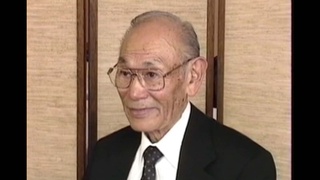Interviews
Her brother’s reasons as a No-No Boy
He had answered “No” to those two questions, because he said, “No, I’m a pacifist, I don’t believe in killing, and therefore I wouldn’t bear arms under any circumstances,” and the second, he said, “No, because I didn’t swear allegiance to the emperor of Japan in the first place, and so why should I forswear allegiance?” And so he answered “No” to the questions. And – as I said, apparently, nobody read the questionnaires after – we had left camp anyway.
So about a year – we were in Cincinnati for about a year, at University of Cincinnati, and the FBI came to his rooming house to ask him, with a copy of his questionnaire, to – if he would change his answers to “Yes.” And I remember Mike said he – said, “No,” he wasn’t gonna change it. And – and I remember yelling at him, I said, “What? Are you crazy?”
Of course he was expelled from the school. Because…the school – well he wasn’t expelled actually; they said that they were doing “sensitive war work on campus,” and therefore, the campus was “off-limits” to him. And so then he was not able to take his final exams at the end of his first year. And so then he failed all his classes. And so then he immediately – he left Cincinnati to go to Boston – he graduated from Boston University later.
Date: August 7, 2018
Location: California, US
Interviewer: Sharon Yamato
Contributed by: Watase Media Arts Center, Japanese American National Museum
Explore More Videos

Lack of political power led to camps
(1924-2018) Researcher, Activist

Results of being more American than Japanese
(1924-2018) Researcher, Activist

Choice to move east or go to Japan
(b.1920) Japanese Canadian Nisei. Established the Ikenobo Ikebana Society of Toronto


Institutionalization as a bad aspect of camp
(1924-2018) Researcher, Activist

State Department records show concern for treatment of Japanese American internees
(1924-2018) Researcher, Activist

Remembering December 7, 1941
(1923-2011) Lawyer, MIS veteran, founder of Francis and Sarah Sogi Foundation

Japanese musical education
(b.1943) Shin-issei grand master of taiko; founded San Francisco Taiko Dojo in 1968.

Rewards of teaching
(b. 1924) Political scientist, educator, and administrator from Hawai`i

Meeting Japanese Americans from the mainland in MIS
(1923-2011) Lawyer, MIS veteran, founder of Francis and Sarah Sogi Foundation

Awareness of concentration camps as a Japanese American
(1923-2011) Lawyer, MIS veteran, founder of Francis and Sarah Sogi Foundation

Manhunt
(1919 - 2005) Challenged the constitutionality of Executive Order 9066.

The Final Verdict
(1919 - 2005) Challenged the constitutionality of Executive Order 9066.

The Kids and Japanese Language (Japanese)
(b. 1937) A war bride from Yokohama

Father’s will to have Japanese education
(b. 1922) Canadian Nisei who was unable to return to Canada from Japan until 1952
